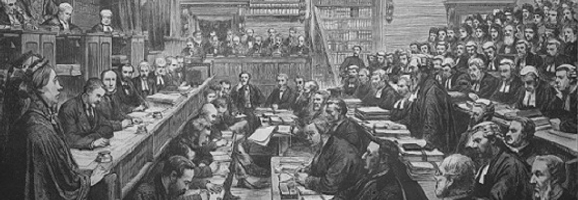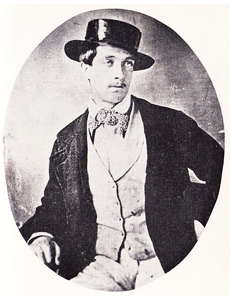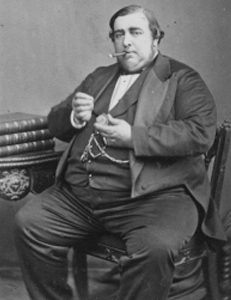
Fraudulent claims to riches are nothing new, but the strange case of Arthur Orton, who came to be known as the ‘Tichborne Claimant’ bears telling.
Arthur Orton was born in Wapping on the 20th March 1834, the son of George Orton, who, at that time was a butcher and seller of ships’ provisions, a trade in great demand in Wapping which was the centre of the East End Docks. Ships setting sail would visit George Orton’s store to stock up on goods and provisions prior to commencing their journeys overseas.
The young Arthur left his school early, not uncommon in those days, to help his father in the shop, and by the age of 15 he found himself as an apprentice to a Captain Brooks, master of the vessel ‘Ocean’.
The ‘Ocean’ set sail for South America, but shortly after reaching land, Arthur Orton deserted and fled to a small town in the Chilean countryside. He remained in Chile for around 18 months during which time he befriended a family called the Castro’s, before returning to London as an ordinary seaman…
Some 15 years later, in August 1865, a series of advertisements began to appear in a number of Australian newspapers requesting information on the fate of a Roger Charles Tichborne. The advertisements had been placed by his mother, Lady Tichborne following her sons disappearance from a vessel called the ‘Bella’ which had vanished in the seas off South America in 1854.

Roger Tichborne
Lady Tichborne was staunch in her belief that her son was still alive, but the view was not shared by other members of the family, particularly Roger’s younger brother who, as the courts had formerly declared Roger dead, inherited both the Tichborne baronetcy and the family estates.
However, in 1866, a butcher and stockman for squatters in Wagga Wagga, Australia came forward claiming to be the missing Sir Roger. The butcher was known locally as ‘Thomas Castro’.
Extensive court proceedings followed, and contested ‘Castro’s’ claim, and evidence was presented to the court that in fact, the claimant was actually Arthur Orton who was attempting to secure for himself the title and riches of the Tichborne family. Jack Whicher, a detective from Scotland Yard had discovered that as soon as he had arrived in England prior to the court case, ‘Castro’ had visited the Wapping area and had started to enquire about the Orton family. This was seen by the courts as evidence that the claimant was indeed Arthur Orton, not Thomas Castro. However, Lady Tichborne, possibly out of grief or desire to see her eldest son again, recognised him as her son with absolute conviction.

Arthur Orton
We can only begin to wonder at the Baroness’ judgement as the claimant, far from being the slight and well educated individual that had left Britain was now an unrefined and grossly obese character who bore little resemblance to those who had known Roger Tichborne.
After a protracted court case, the verdict of the jury was that ‘Castro’ was indeed Arthur Orton and he was duly sentence to fourteen years imprisonment for perjury. He was eventually released in 1884 after serving ten years of his sentence. He continued to claim he was Roger Tichborne, but in 1895, the claimant allegedly confessed to being Arthur Orton. However, that confession was retracted almost immediately, and he finally died in 1898 in poverty.
